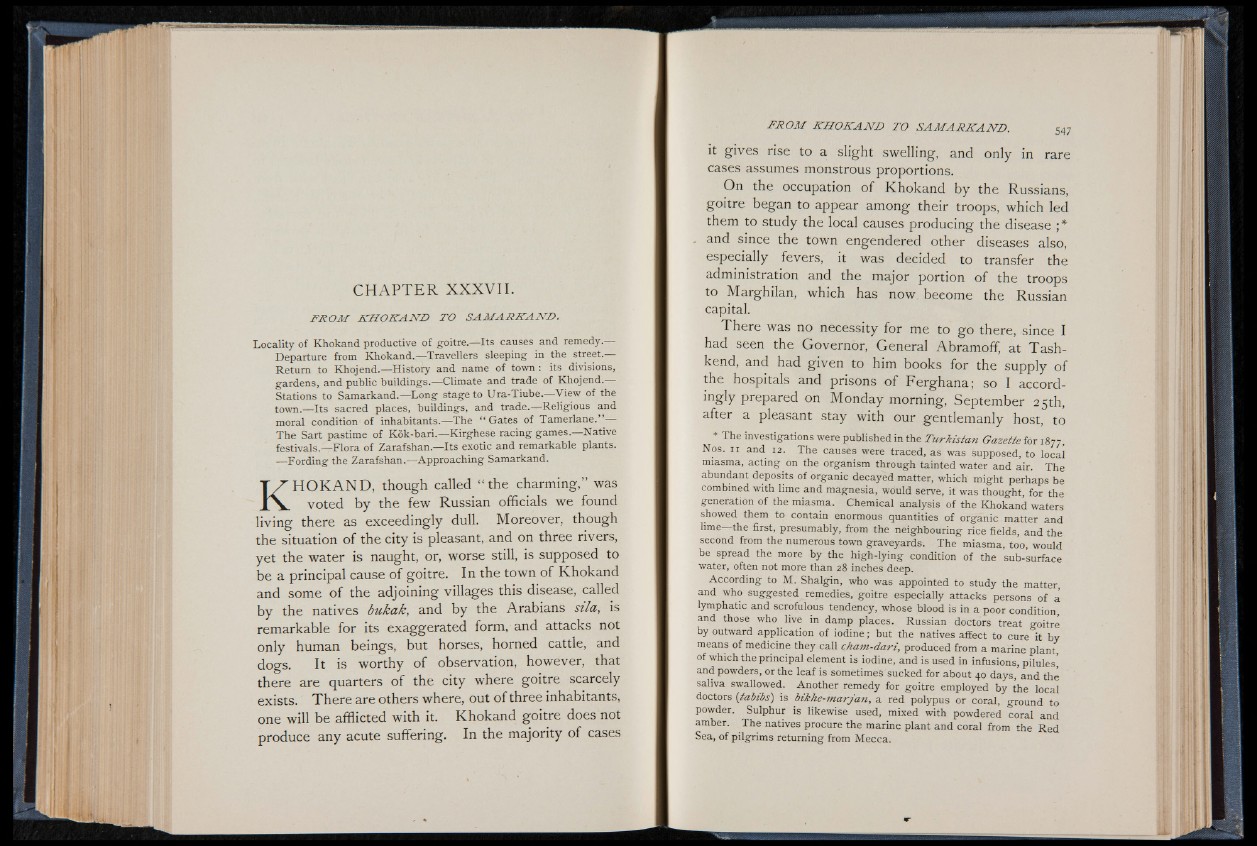
C H A P T E R X X X V I I .
F R OM K H O K A N D TO S AM A R K A N D ,
Locality of Khokand productive of goitre.— Its causes and remedy.—
Departure from Khokand.— Travellers sleeping in the street.—
Return to Khojend.— History and name of town : its divisions,
gardens, and public buildings.— Climate and trade of Khojend.
Stations to Samarkand.— Lon g stage to Ura-Tiube.— View of the
town.— Its sacred places, buildings, and trade.— Religious and
moral condition of inhabitants.— The “ Gates of Tamerlane.
The Sart pastime of Kok-bari.— Kirghese racing games.— Native
festivals.i§Flora of Zarafshan.— Its exotic and remarkable plants.
— Fording the Zarafshan.-—Approaching Samarkand.
KH O K A N D , though called “ the charming,” was
voted by the few Russian officials we found
living there as exceedingly dull. Moreover, though
the situation of the city is pleasant, and on three rivers,
yet the water is naught, or, worse still, is supposed to
be a principal cause of goitre. In the town of Khokand
and some of the adjoining villages this disease, called
by the natives bukak, and by the Arabians sila, is
remarkable for its exaggerated form, and attacks not
only human beings, but horses, horned cattle, and
dogs. It is worthy of observation, however, that
there are quarters of the city where goitre scarcely
exists. There are others where, out of three inhabitants,
one will be afflicted with it. Khokand goitre does not
produce any acute suffering. In the majority of cases
it gives rise to a slight swelling, and only in rare
cases assumes monstrous proportions.
On the occupation of Khokand by the Russians,
goitre began to appear among their troops, which led
them to study the local causes producing the disease ;*
. and since the town engendered other diseases also,
especially fevers, it was decided to transfer the
administration and the major portion of the troops
to Marghilan, which has now beeome the Russian
capital.
There was no necessity for me to go there, since I
had seen the Governor, General Abramoff, at Tash-
kend, and had given to him books for the supply of
the hospitals and prisons o f Ferghana; so I accord-
ingly prepared on Monday morning, September 25th,
after a pleasant stay with our gentlemanly host, to
* The investigations were published in the Turkistan Gazette for 1877,
Nos. 11 and 12. The causes were traced, as was supposed, to local
miasma, acting on the organism through tainted water and air. The
abundant deposits of organic decayed matter, which might perhaps be
combined with lime and magnesia, would serve, it was thought, for the
generation of the miasma. Chemical analysis of the Khokand waters
showed them to contain enormous quantities of organic matter and
lime the first, presumably, from the neighbouring rice fields, and the
second from the numerous town graveyards. The miasma, too, would
be spread the more by the high-lying condition of the sub-surface
water, often not more than 28 inches deep.
According to M. Shalgin, who was appointed to study the matter,
and who suggested remedies, goitre especially attacks persons o f à
lymphatic and scrofulous tendency, whose blood is in a poor condition,
and those who live in damp places. Russian doctors treat goitre
by outward application of iodine ; but the natives affect to cure it by
means of medicine they call çham-dari, produced from a marine plant,
of which the principal element is iodine, and is used in infusions, pilules,
and powders, or the leaf is sometimes sucked for about 40 days, and thé
saliva swallowed. Another remedy for goitre employed by the local
doctors {tabibs) is bikhe-marjan, a red polypus or coral, ground to
powder. Sulphur is likewise used, mixed with powdered coral and
amber. The natives procure the marine plant and coral from the Red
Sea, of pilgrims returning from Mecca.